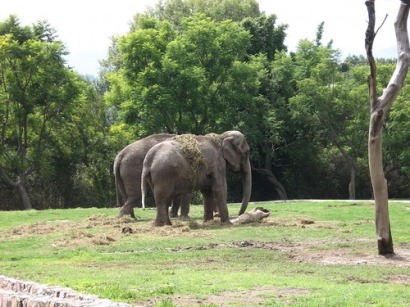
“Animal waste can create electricity, heat, fertilizer ... even clean water can be extracted from the solids to spray on crops ... So, it's emblematic of this very holistic approach," Geraint Evans, head of biofuels at the UK's National Centre for Biorenewable Energy, Fuels and Materials, told CNN in a recent article after finding out about the project to generate biogas using elephant dung at Munich Zoo (Germany). Sources from the zoo claim that it is the only one in the country generating power in this way.
The zoo has installed three 100 cubic-metre containers for waste from herbivores, primarily the zoo’s Asian elephant population. According to the zoo, this represents around a week’s worth of dung collected from the enclosures. Anaerobic digestion then takes place inside the containers, which leads to the generation of biogas after around 30 days. The biogas is then used to cover 5% of the zoo’s electricity demand, while heat from the process is siphoned off and used to warm the gorilla enclosure.
Heat for 25 homes and power for 100
CNN, which first reported this story on its website, cited park supervisor, Dominik Forster, who said that the thermal output from the biogas facility “could be used to heat about 25 homes”. He also added that 100 homes in Munich could be provided with electricity if all the herbivores’ dung was used to produce biogas and subsequently, power. He also mentioned that once the biogas fermentation process is over, the remaining digestate or solid residue is used as an organic fertilizer to grow crops that will later be used as feedstock for the animals.
Beyond using dung from livestock, several projects are at the research stage or are underway to generate biogas using other animal waste, and even human excrement. Poo power is already being used in Asia and Africa, albeit in an unhygienic manner that leads to illness and even death from the inhalation of toxic gases. As such, several NGOs, such as Engineers without Borders and Mavuno Project in Tanzania and Spain’s Intervida in India are working to improve these technologies. Elsewhere, the French company, Suez Environnement, is conducting research into using baby’s nappies, or more precisely the excrement and urine they contain, to generate energy.
[Photo: Courtesy of Zerethv]
For additional information:

